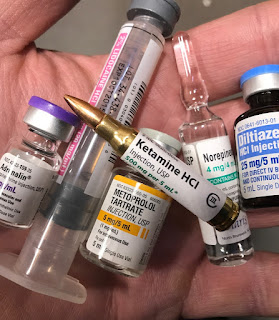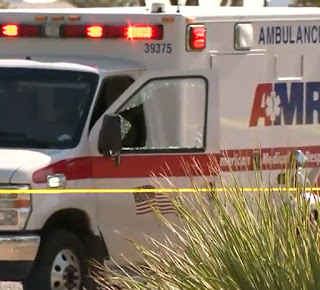The Story That Wasn’t
Today I didn’t die. I didn’t come face to face with an armed criminal, and I didn’t have to fight for my life. Today I got to leave work, go home, and see my wife and children. So did everyone else that I work with. I call that a good day. Yet, regardless of whether you believe in fate or simply a Universe of random quantum fluctuations bubbling and foaming reality into existence, my day could have been much worse.
We dropped low on available ambulances late this morning and, as is our procedure, several managers got geared up to put ALS rigs in service. I donned my uniform, grabbed an out of service ambulance, and stocked it with portable equipment. I pulled the truck around to the side of the building where my office is, locked it up, and left it so that I could jump on as soon as a partner became available. As it turned out, we got several units back in service quickly and I did not end up going out. I did, however, leave the ambulance there outside of our training entrance just in case it got busy again.
An hour or so went by and I got a call from one of our supervisors who asked if I’d be able to drive over to our satellite office to pick up some items he needed. I assured him I would, used the bathroom, and headed out the door. I hopped in the truck that was still parked outside, pulled out of the driveway, and was about a mile down the road when I heard dispatch advise a crew at our station to lock their truck and get inside. Next a general alert tone went out followed by a message for all crews to stay clear of headquarters due to a police emergency.
I pulled over and called dispatch to find out what was going on. All they knew was that there was a report of shots fired nearby and that all the businesses in our light industrial campus were on lock-out precautions. Within a few minutes the road to our headquarters was blocked by law enforcement. Shortly after that, a helicopter began making low altitude circles overhead.
We can prepare for things, think about plans and SOPs, watch our backs and the backs of our colleagues, and even train for unlikely events. What we CAN’T do is control timing. Being in the right place at the right time or the wrong place at the wrong time is largely a matter of fate- or quantum bubbles.
This afternoon, two minutes after the quantum bubbles aligned to have me leave the station, something happened at the building next door. We don’t have details at this time but what we do know is that several shots were fired, and the armed suspect pictured here fled through our parking lot. He ran past the training side of our building and ditched his firearm in our bushes.

A smoldering ember of thought began today once I was cleared to drive back to headquarters: If I had finished an email, grabbed a cup of coffee for the ride, or even stopped to chat with someone before leaving, I could have literally crossed paths with this guy. Probably desperate and likely not thinking clearly, this is a person who could have made my day very bad.
I’m a big man. I’m a DT4EMS instructor. I’ve been slowly getting back into some kind of physical condition. I am NOT, however, clairvoyant. And despite the fact that we teach situational awareness as a golden rule in our Escaping Violent Encounters course, I would most certainly not have been prepared for that encounter on a beautiful, sunny afternoon, in the parking lot of our station, in one of the most affluent suburbs of Western New York.
This is not a tale of how dangerous the job of the Education Director is, nor is it a “look how lucky I am” piece. What it is is a simple reminder that, at any time, in any place, the unexpected can happen. We should prepare ourselves mentally, physically, and perhaps even spiritually to deal with things that might come our way. However, if we aren’t vigilant we can still be caught off-guard, and this is why situational awareness is so important to provider safety.
Some time later, as I sat outside of the building with the rest of our staff, I watched the police do their investigative procedures and rolled scenarios through my head. What would I have done if this man had tried to steal my ambulance? If he’d tried to force me to unlock the doors to our station? If he’d attacked me physically? It was all mental prep exercise - scenarios to help me be faster and more decisive. Just as training for chest decompressions or managing difficult airways can increase our skill levels, mental scenarios about personal safety help speed neural responses and increase our likelihood of surviving violence. I also thought about situational awareness. What can I do in the future to bridge the fine line between paranoia and keeping myself safe while on duty? It’s an important question to consider, and one that I’ll be mulling over for a while.
Today mere timing stopped a bad story from being told. But training and vigilance are far better methods for killing stories- stories about mismanaged patients, about ambulance crashes, and about a provider’s violent encounter. I am grateful tonight for untold stories and that I and all of our personnel are unharmed.
Train, prepare, and be safe out there, everyone.


Comments
Post a Comment